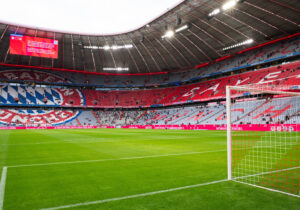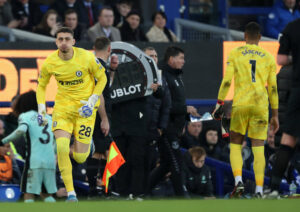Wolverhampton Wanderers have enjoyed a truly remarkable campaign, if an occasionally baffling one. With just 10 points from a possible 30 against the bottom-five, replicating the form they showed against the top six could have carried them to new heights.
The Curious Case of Wolverhampton Wanderers
At 19, Wolverhampton Wanderers have the smallest squad size in the Premier League. Nevertheless, their stamina, fearlessness and determination against the elite has taken them to an FA Cup semi-final and they look destined for a comfortable top-half finish.
Across all competitions, Nuno Santo’s men have beaten Liverpool, Chelsea, Manchester United and Tottenham Hotspur. Elsewhere, they have picked up impressive points against Manchester City and Arsenal in the Premier League.
This stunning form against the so-called top six has fired them into touching distance of a Europa League spot. What has held them back, however, is their peculiarly poor form against the Premier League’s lower sides.
On Saturday, this worrying trend was reinforced by a disappointing 3-1 defeat against Southampton. Wolves registered 70 per cent possession and 17 shots on target, yet only two of them hit the target.
Overall, they lacked the spark, fear factor and clinical prowess that is so often exhibited against the top sides. To the dismay of their fans, this glaring disparity can be plainly illustrated by several results this season.
For example, Wolves racked up two wins and one draw against Manchester United this season, but bottom-placed Huddersfield Town performed the double over them and, in doing so, accumulated six of their 14 points.
What Could Have Been
If they had emerged victories in their clashes against the Terriers, their claim for seventh-place would have been hugely strengthened.
Moreover, a draw against Fulham and losses against Cardiff City, Brighton, Burnley and now Southampton means that Wolves have picked up a mere 10 points out of 30 against the bottom five this season.
Retrospectively their fans will certainly rue these performances, as victories would have put them in Champions League contention.
Currently, however, they find themselves fighting for a spot in the Europa League. In theory, their form against the top six suggests that Wolves are undeniably the ‘best-of-the-rest’ and should have comfortably secured seventh place already.
If they fail to do so, then this season will feel like a strange mix of both over and under-achievement. Their performances against the top sides have made their return to the top flight successful and memorable, yet Wolves fans would have loved to see their side demonstrate the same competence more consistently.
This would have certainly taken them to another level. Achieving it, however, is a tall order for a newly-promoted side with such a thin squad.
Can it be Explained?
It has been suggested that a kind of ‘underdog complex’ may explain Wolves’ unpredictable form. Seemingly, they reserve their best football when faced with tough opponents as the occasion unlocks their full potential.
For whatever reason, though, they seldom replicate such strong performances against the lower sides. Wolves fight hammer and tongs against the elite, so when facing less prestigious opposition there is a drastic physical and psychological change.
This was recently demonstrated by a 2-0 loss to Burnley, which came sandwiched between two victories against Manchester United.
With such a small squad, by extension, rotation is not always effective or possible. Additionally, over half of Nuno Santo’s squad are internationals and they had a challenging and lengthy FA Cup run to contend with.
There is, perhaps, a more straight-forward tactical explanation. It has been widely observed that Wolves are exposed when they betray their defensive, counter-attacking impetus against the lower sides.
On average, Wolves rarely manage any higher than 40% possession against the top sides and often strike on the counter-attack.
This has resonances with Leicester City‘s title-winning campaign as they too had low possession stats and effectively played the role of David against the Premier League’s many Goliaths. The difference is the gulf in consistency and the fact that Leicester never wavered against clubs lower down the table.
Plenty to Build On
Though they have had some rocky periods, this campaign has been extremely successful. If Wolves consistently maintained the same tactics and changed their mentality against teams lower down the table, however, then they would have enjoyed even more success in the Premier League.
For a newly promoted side, what they have achieved is remarkable nonetheless. They were minutes away from reaching an FA Cup final and have quickly become an outfit that no side wants to face.
Addressing the issue of fatigue should be relatively simple as Nuno Santo will look to introduce more strength in depth. This will theoretically be made possible by how attractive Wolverhampton Wanderers are at present. Raul Jimenez has already committed a long-term stay at Molineux, and many more follow in his footsteps this summer.
Shaking off the complacency and changing the mentality against smaller sides, however, is a more deep-rooted issue. This can be partly resolved by a more consistent tactical approach, but the Wolves players must stop expecting to win against sides outside the top six. This is the Premier League, after all.
If they can continue their prowess against the Premier League’s top sides and rectify their inconsistency against more ‘beatable’ sides, then it would be foolish to exclude them from the Champions League conversation next season.
Nuno Santo’s project is only in its infancy and can only go from strength to strength. Wolves had a wonderful tight-knit core, a great leader in Conor Coady and some special players to boot. They must now kick on.
Main Photo
Embed from Getty Images






